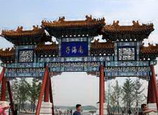
China should hammer home the knowledge that the pursuit of an excessively high economic growth through adopting temporary stimulus measures is against economic law. The country should realize that maintaining a stable monetary supply and avoiding the use of short-term policies to stimulate faster economic growth are particularly important ways to maintain financial stability and hedge against financial risks. Without a rise in its effective investment demand, increased monetary supplies alone will not promote a sound development of the national economy. On the contrary, it will only add more fluidity and financial risks.
China's decision-makers should be also aware that refraining from adopting short-term stimulus measures does not mean policy inaction. Although China's economic deceleration conforms to economic law, that does not mean that its current input and output ratio and its current economic growth structure are reasonable, or guarantee that the country's current economic growth rate, although slower to some extent than before, can be sustained in the years ahead. Although no short-term stimulus measures have been worked out, the issue of the country's huge fluidity has not been resolved.
China should shift its policy resources to the creation of effective investment demand and guide huge volumes of non-governmental capital to participate in effective economic activities. A series of measures recently taken by the government, from reducing or delegating to lower-level departments administrative approval power and opening some railway construction projects to private capital, as well as expanding the practice of turning business tax to value-added tax and extending the period of tax exemption for some small and medium-sized enterprises, are steps in this direction and will play a constructive role in improving the country's economic operation.
But what China urgently needs to do is to improve the quality of its economic growth, give non-governmental capital more room to maneuver, and increase efforts to cultivate forces that can help sustain its economic growth instead of the adoption of short-term stimulus measures or a looser monetary policy.

















 Developer razes historic Guangzhou structures
Developer razes historic Guangzhou structures


![]()
